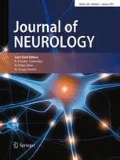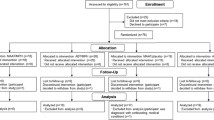Abstract
Background and purpose
To analyse the prospect of memory training for patients with organic brain damage.
Methods
Sixty-two patients with memory disorder were assigned to three different groups: a control group (n=16) with low dose memory training, a process oriented memory training group (POT) (n=24) and a group (ST) who was taught to compensate for memory problems with different strategies (n=22). Most of the patients had suffered a stroke. Inclusion criteria were medium to weak memory impairment defined by the patients’ performance in the California Verbal Learning Test. Patients with complete amnesia were excluded. Specific care was taken that the groups did not differ in age, time since illness, duration of rehabilitation effort, verbal and performance IQ,memory and attention performance. The two treatment groups received 20 hours memory training, the low dose memory training control group 7 sessions.
Results
The treatment groups improved in verbal and prospective memory, but only the group with POT experienced a significant improvement compared with the control group. Training effects were specific, i. e. they affected verbal memory, but were not encapsulated, i. e. generalized to the recall of prose passages and of appointments. The POT group also showed a statistically weak outperformance compared with the ST group and some attentional improvement as well.
Conclusion
Memory training is effective in patients with organic brain lesion, but only if applied frequently. Comparing the two training high intensity treatments, a POT focus seems to be superior to teaching a set of compensation strategies.
Similar content being viewed by others
References
Ball K, Berch DB, Helmers KF, Jobe JB, Leveck MD (2002) Effects of cognitive training interventions with older adults. JAMA 288:2271–2281
Bäumler G (1974) Lern- und Gedächtnistest: LGT-3. Göttingen: Hogrefe
Berg IJ, Koning-Haanstra M, Deelman BG (1991) Long-term effects of memory rehabilitation: a controlled study. Neuropsychol Rehabi 1:97–111
Broek MD van den, Downes J, Johnson Z, Dayus B, Hilton N (2000) Evaluation of an electronic memory aid in the neuropsychological rehabilitation of prospective memory deficits. Brain Injury 14:455–462
Bußmann BA, Hildebrandt H (1998) Rehabilitation sprachlicher Gedächtnisstörungen durch semantisches Gruppieren und die Methode des Spaced-retrieval. Neurol Rehabil 4:236
Bußmann-Mork BA, Hildebrandt H, Gießelmann H, Sachsenheimer W (2000) Behandlung mittelschwerer sprachlicher Gedächtnisstörungen: ein Vergleich mehrerer Methoden. Neurol Rehabil 6:195–204
Dahl G (1986) WIP-reduzierter Wechsler Intelligenztest. Königstein: Hain
Doornhein K, De Haan EHF (1998) Cognitive Training for memory deficits in stroke patients. Neuropsychol Rehabli 8:393–400
Gauggel S, Niemann T (1996) Evaluation of a short-term computer-assisted training program for the remediation of attentional deficits after brain injury: A preliminary stud International J Rehabli Res 19:229–239
Glisky EL, Schacter DL, Butters MA (1994) Domain-specific learning and remediation of memory disorders. In: Riddoch,MJ, Humphreys GW (eds) Cognitive Neuropsychology and Cognitive Rehabilitation. Hove, Hillsdale: Lawrence Erlbaum Associates Publishers, pp 527–548
Götte HJ, Vaterrodt T (1999) Prognostische Kriterien der Rehabilitation des Schlaganfallpatienten. Rehabilitation 38:88–91
Henke K, Kroll NEA, Behniea H, Amaral DG, Miller MB, Rafal R (1999) Memory lost and regained following bilateral hippocampal damage. J Cogn Neurosci 11:682–697
Hildebrandt H, Gießelmann G, Sachsenheimer W, Schwendemann G (2001) Topisch-neuropsychologische Diagnostik sprachlicher Gedächtnisdefizite. Fortschr NeurolPsychiatrie 69:32–41
Horn W (1983) Leistungsprüfsystem: LPS. Göttingen: Hogrefe
Ilmberger J (1988) Deutsche Version des California Verbal Learning Tests. Unveröffentlichte Arbeit: Institut für medizinische Psychologie
Ishizaki J, Meguro K, Ohe K, Kimura E, Tsuchiya E, Ishii H (2002) Therapeutic psychosocial intervention for elderly people with very mild Alzheimer Disease in a community: The Tajiri Project. Alzheimer Dis Associ Disord 16:261–269
Kamper DG, McKenna-Cole AN, Kahn LE, Reinkensmeyer DJ (2002) Alterations in reaching after stroke and their relation to movement direction and impairment severity. Arch Physl Mede Rehabiln 83:702–707
Kaschel R (1994) Neuropsychologische Rehabilitation von Gedächtnisleistungen. Weinheim: Beltz, Psychologie Verlags Union
Kolb IA (1995) Brain Plasticity and Behavior.Hillsdale: Lawrence Erlbaum
Kopp B, Kunkel A, Mühlnickel W, Villringer K, Taub E, Flor H (1999) Plasticity in the motor system related to therapy-induced improvement after stroke. NeuroRepor 10:807–810
Levine B, Cabeza R, McIntosh AR, Black SE, Grady CL, Stuss DT (2002) Functional reorganisation of memory after traumatic brain injury: a study with H(2)(15)0 positron emission tomography. J Neurol Neurosurg Psychiatry 73:173–181
Majid MJ, Lincoln NB, Weyman N (2000) Cognitive rehabilitation for memory deficits following stroke. Cochrane Database System Review 3:CD002293
Mateer CA, Sohlberg MM, Youngman PK (1990) The management of acquired attention and memory deficits. In:Wood RL, Fussey I (eds) Cognitive Rehabilitation in Perspective. London: Taylor and Francis, pp 68–95
Matthes-v. Cramon G, Cramon DY (1995) Kognitive Rehabilitation. Zeitschrift für Neuropsychologie 6:116–127
Miltner WHR, Bauder H, Sommer M, Dettmers C, Taub E (1999) Effects of constraint-induced movement therapy on patients with chronic motor deficits after stroke. A replication. Stroke 30:586–592
Oswald WD, Fleischmann UM (1986) Nürnberger-Alters-Inventar: NAI. Nürnberg: Oswald and Fleischmann
Pulvermüller F,Neininger B, Elbert T, Mohr B, Rockstroh B, Koebbel P, Taub E (2001) Constraint-induced therapy of chronic Aphasia after stroke. Stroke 32:1621–1626
Robertson IH, Murre JMJ (1999) Rehabilitation of brain damage: Brain plasicitiy and principles of guided recovery. Psychol Bull 125:544–575
Sohlberg MM, Mateer CA (1989) Introduction to cognitive rehabilitation: Theory and practice. New York: Guilford Press
Thöne AIT, v. Cramon DY (1999) Gedächtnisstörungen. In: Frommelt P, Grötzbach H (eds) Neuro Rehabilitation. Berlin: Wien: Blackwell Wissenschafts-Verlag, pp 293–305
Unverhau S (1998) Metakognitive Gedächtnistherapie. Neurol Rehabil 4:294–300
Wechsler D (1987) WMS-R—Wechsler Memory Scale—Revised.New York: The Psychological Corporation
Wilson BA, Evans JJ, Emslie H, Malinek V (1997) Evaluation of neuropage: a new memory aid. J Neurol Neurosurg Psychiatry 63:113–115
Wilson BA, Cockburn J, Baddeley AD (1995) A Rivermead Behavioural Memory Test. Deutsche Übersetzung: Beckers K, Behrends U, Canavan A (1992). Bury St. Edmunds: Thames Valley Test Company
Wilson BA (1995) Management and remediation of memory problems in brain-injured adults. In: Baddeley AD, Wilson BA, Watts FN (eds) Handbook of memory disorders. Chicester, New York: John Wiley and Sons, pp 451–480
Wilson BA (1987) Rehabilitation of memory. New York: Guilford Press
Author information
Authors and Affiliations
Corresponding author
Rights and permissions
About this article
Cite this article
Hildebrandt, H., Bussmann-Mork, B. & Schwendemann, G. Group therapy for memory impaired patients: A partial remediation is possible. J Neurol 253, 512–519 (2006). https://doi.org/10.1007/s00415-006-0013-6
Received:
Revised:
Accepted:
Issue Date:
DOI: https://doi.org/10.1007/s00415-006-0013-6



